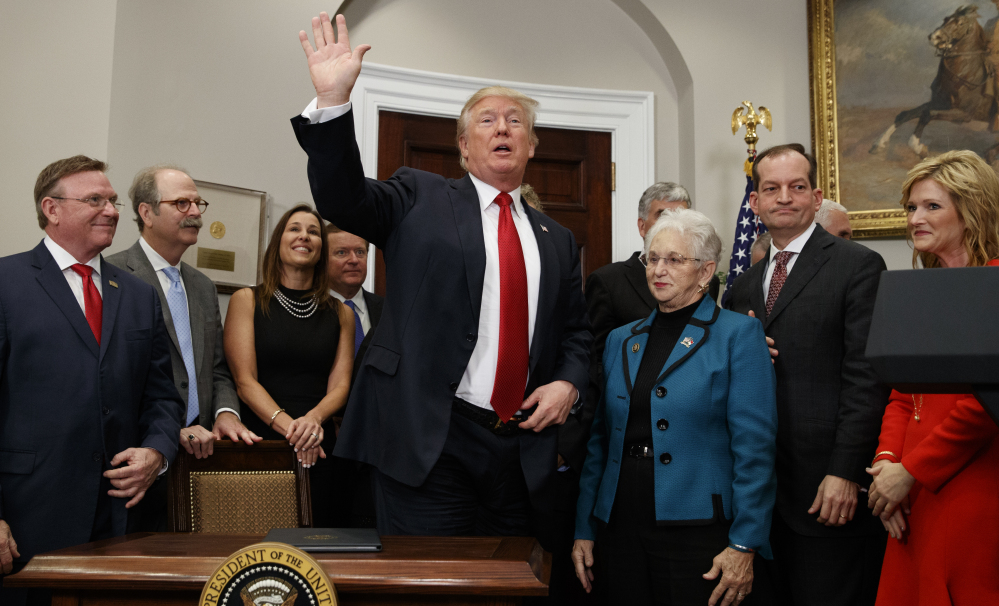WASHINGTON — Frustrated with his inability to spur Congress to act on much of his agenda, President Trump is increasingly using his executive powers in a risky bid to gain leverage with lawmakers on an array of unfulfilled campaign promises.
After his announcement that he is cutting off health-care subsidies key to the Affordable Care Act, Trump voiced hope that the move would force Democrats to join him in his stymied effort to pass a health-care overhaul in the Republican-led Congress.
After proclaiming the end of a popular program that shields young undocumented immigrants from deportation, Trump offered to continue it – but only if lawmakers move on several of his stalled priorities in return, including funding a U.S.-Mexico border wall that was central to his campaign.
And on Friday, Trump disavowed the international nuclear deal with Iran but held out the possibility of keeping the United States in the pact if Congress attaches new conditions to a deal that he continually derided as a candidate.
The strategy has been cheered by many of the president’s core supporters, who view it as Trump making good on his pledge to be a disruptive force in Washington while dismantling the legacy of former President Obama.
“Any time he can be viewed as a strong, disruptive force, hitting D.C. with a wrecking ball, his core base of supporters love it,” said Ron Bonjean, a Republican consultant close to the White House.
But such political hostage-taking carries considerable risk, particularly given the paralysis that has gripped Congress in the first nine months of the Trump presidency and the real possibility that the “deals” Trump is seeking won’t materialize. Hanging in the balance now are the ability of millions of Americans – including many of Trump’s working-class supporters – to afford health insurance, the fate of hundreds of thousands of “dreamers” who could face deportation, and the international standing of the United States.
“There’s nothing clever about creating a crisis and hoping Congress responds when the American public is in the crosshairs,” said Cecilia Muñoz, a longtime immigrant rights advocate who served as Obama’s White House domestic policy adviser.
Trump’s critics also accuse him of hypocrisy for employing executive orders and other actions at a time when his agenda is stalled in Congress. Trump and other Republicans excoriated Obama for similar tactics, calling him an “emperor” and a “monarch,” particularly during the latter part of his presidency, when he faced a hostile Republican Congress.
In Trump’s case, he is acting on his own even as his party controls the House and Senate. And Trump is now on pace to sign more executive orders than any president in the past 50 years – although some of those actions, particularly early in his term, had limited impact.
Trump’s use of executive power to upend the status quo has extended to other areas, including an attempt to renegotiate NAFTA, which was underscored by Canadian Prime Minister Justin Trudeau’s visit to the White House this past week. Trump’s administration also announced a proposed rule that would repeal regulations aimed at curbing greenhouse gas emissions from U.S. power plants.
Trump aides acknowledge that some of his recent actions stem from his frustration with Congress, which the president has made no effort to hide on Twitter and in public appearances. And they defend his frequent use of executive orders as necessary to undo actions by Obama they consider unconstitutional or otherwise legally problematic.
“The president campaigned on a bold agenda, and Congress’s inaction won’t stop the administration’s tireless efforts to boost the economy, improve health care and protect the American people,” said White House principal deputy press secretary Raj Shah.
Supporters outside Washington say the moves show a president unwilling to take no for an answer as he tries to make good on his campaign promises.
“The president is doing what he said he’s going to do,” said Terry Lathan, chairman of the Republican Party of Alabama. “He’s not a man to sit back and wait when told not to do something. That’s not how he’s wired. It’s one of the reasons he got elected. He will not let barriers stand in his way. He’ll go over, under, around it to get something done.”
But Trump’s critics expressed dismay that he has tried to upend many of Obama’s initiatives without a clear strategy of how to move forward to protect some of the country’s most vulnerable populations, which already are being harmed.
Trump announced Thursday that he was ending insurer subsidies that have been used to lower costs for those who purchase insurance on the individual market under Obamacare. A nonpartisan congressional analysis has suggested that the move could lead to a 20 percent increase in premiums next year.
“What he’s done on health care is nothing short of sabotage,” said Connecticut Democratic Gov. Dannel Malloy.
“Millions of Americans are paying a price for his egocentric behavior, for his narcissistic behavior.”
Malloy argued that Trump seemed motivated more by undoing Obama’s legacy than by advancing any coherent policy aims of his own.
“If he had followed Lincoln, he’d have tried to reinstate slavery,” said Malloy, who chairs the Democratic Governors Association.
Send questions/comments to the editors.



Success. Please wait for the page to reload. If the page does not reload within 5 seconds, please refresh the page.
Enter your email and password to access comments.
Hi, to comment on stories you must . This profile is in addition to your subscription and website login.
Already have a commenting profile? .
Invalid username/password.
Please check your email to confirm and complete your registration.
Only subscribers are eligible to post comments. Please subscribe or login first for digital access. Here’s why.
Use the form below to reset your password. When you've submitted your account email, we will send an email with a reset code.